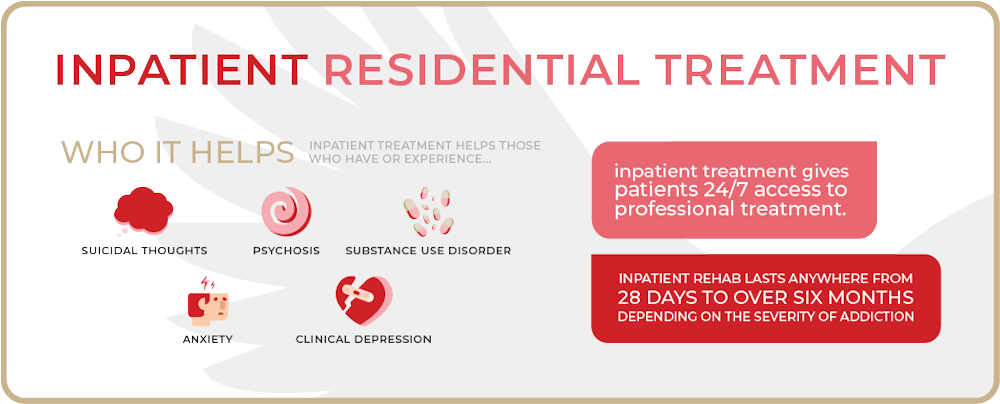However, there is hope. Addiction is a treatable disorder, and timely intervention can save lives. Seeking professional help in a rehabilitation facility offers a pathway to recovery and freedom from drug addiction. If you or a loved one is struggling with addiction, it’s crucial to choose the right treatment option. Inpatient rehab programs have proven to be particularly effective, providing the structured support needed for successful addiction recovery.
What Is Inpatient Treatment?
The main aim of this addiction treatment option is to remove the client from a trigger-filled environment and make them fully involved in their treatment. You can stay in the rehab facility for 30 to 90 days or longer, based on the severity of your condition. People with co-occurring mental health disorders will sometimes have longer stays.

Types of Inpatient Rehab Programs

Inpatient Residential Rehab
Partial Hospitalization

What Happens in an Inpatient Treatment?

Once you check in at a rehab facility, an experienced doctor will receive you. You will then undergo a comprehensive medical analysis to determine the extent of your condition. Depending on the facility, you may undergo a toxicology or medical test to evaluate blood pressure, temperature, and current drug status. The physician will also determine the severity of any mental health issues.
The admission coordinator will ask you some personal questions to guide them in determining the proper care level that you will need. They will ask what substance you use, the duration of your use, and other questions such as the nature of your home environment and if you have any existing medical conditions. Ensure that you answer the questions truthfully, since this is the first step to maintaining long-term sobriety and preventing relapse.
The first phase of addiction treatment involves flushing out the toxins from your body to prepare you for rehab or intensive outpatient programs, also known as a medical detox. For most people, this is usually a very challenging phase. If you try detoxing without professional assistance, you might develop dangerous withdrawal symptoms that harm your body, can lead to relapse, and can increase the chances of an overdose. One of the main benefits of an inpatient program is that clients will have a safe space to detox with professional monitoring.
Even when you are so willing, you might find the withdrawal symptoms overwhelming. The intensity will differ based on your age, the type of substances that you use, and your body’s tolerance level. Some of these symptoms include:
- Excessive sweating
- High blood pressure
- Insomnia
- Seizures
- Headaches
- Tremors
- Intense cravings
The detox phase may take between three and 10 days, and you begin to experience withdrawal symptoms in the first six hours. Usually, they intensify after 72 hours, and some can last for months.
Although the first days are generally more challenging, you should feel better by the end of the first week. When you opt for the medically supervised detox, a professional will guide you on how to manage the emotional withdrawal and cravings. They might even administer medication to ease the symptoms.
After detox, you immediately start therapy to address life stressors or other factors that led to addiction. Different facilities take varying approaches to therapy. One helpful approach is cognitive-behavioral therapy, which helps clients address feelings and thoughts that encourage drug use. The main aim is to help the individual understand why they experience certain emotions and how such thoughts and actions can trigger drug and alcohol addiction. When someone better understands the reasons behind addiction, they become better equipped to overcome the issue.
During therapy, you will learn that you have the power to modify destructive thoughts and make positive changes in your life. You will learn how to recognize harmful thoughts, cope with stressful situations appropriately, and face your fears. By the end of this therapeutic course, you will regain your self-confidence, learn more adaptive ways of thinking, and you should expect a reduction in your symptoms.
Another highly effective addiction treatment approach for people struggling with substance abuse is contingency management. This option involves giving the clients some incentives after passing the drug test or attending all therapy sessions. Many people love to pursue things that create a sense of reward, and this is how most people get into addiction. Drugs stimulate the production of the feel-good hormone dopamine that is also present as a “reward” when someone does something good for their body. This is how the brain begins to associate the substance used with pleasurable feelings.
Contingency management can help teach an individual how to experience healthy rewards and pleasures. You may get cash prizes or vouchers with some cash value to shop for items that support a balanced, sober life.
Most people turn to substance use as a coping mechanism to deal with life traumas. Lack of motivation can be a significant barrier to recovery. Therapy also involves motivational interviewing to encourage clients to stay committed to the main goal, which is long-term sobriety.
Together, the client and therapist will identify behaviors that need change, fostering a supportive environment where the client feels confident and prepared for transformation. The counselor will encourage the client to set personal goals and take control of their recovery journey, promoting empowerment and positivity. Clients will also learn how and when to seek help during challenging times, ensuring they never feel alone in their fight against addiction.
Inpatient treatment primarily features individual therapy, where the clients meet up one on one with a trained professional to work through personal issues. In these sessions, you may feel more comfortable discussing details you wouldn’t normally like to share in a group setting. You can talk about your pain points, any problems you experience at work, strained relationships, or concerns from friends and relatives without feeling judged.
You can also expect to attend therapy sessions with other people struggling with similar issues as yours in the course of your treatment. In group therapy, you will share experiences and develop better techniques to handle difficult life situations. This highly benefits people struggling with social anxiety or depression. It will also help you establish meaningful relationships with people who have similar goals.
Family therapy is another vital component of the rehab process. It brings together you and your loved ones to try to identify family patterns that contribute to mental health concerns or substance abuse issues. Your family members will have an opportunity to better understand your condition and offer support. As a result, it can help mend troubled relationships with your family members and aid in addiction recovery.
Aftercare
Many rehabilitation centers organize meetups and activities for their alumni. It is highly recommended that you participate in these gatherings and maintain contact with your treatment team. This continued engagement provides the necessary motivation and support to sustain your recovery journey.
Several social networks in today’s communities encourage and support people on their recovery journey. You may join these groups to learn from people going through the recovery process or those who consider themselves fully healed from drug and alcohol addiction.
If your home environment triggers substance abuse, you may want to head to a sober residence home after rehab. These controlled drug-free housing options will help you healthily transition back into your everyday life. You will live among like-minded people, eliminating temptations and possibilities of relapse. There are also strict rules in these houses aimed at promoting accountability and self-sufficiency.
If substance use disorder is affecting your career or academic performance, consider enrolling in an educational or vocational training program. These programs will equip you with the necessary skills and knowledge to effectively re-enter the workforce or continue your education.



















